And still the awards keep coming! In November we saw the announcement of the Prime Minister’s Literary Awards. I won’t share them all here, as you can find it all on the announcement page. I’ll just focus on those relevant to this corner of the AWW Challenge. Here goes:
- Fiction prize: Joint winners were Lisa Gorton’s Life of houses, and Charlotte Wood’s The natural way of things.
- Non-fiction: One of the joint winners was Karen Lamb’s Thea Astley: Inventing her own weather. The co-winner was a woman writer too, Sheila Fitzpatrick, but I’m not sure her book fits my category here.
Another award – the MUBA (or Most Underrated Book Award) – was announced in November, and while a woman didn’t win it, Emma Ashmere was shortlisted with her fascinating historical fiction novel, The floating garden. All of these books, I’m pleased to say, have been reviewed by challenge participants.
The final set of awards I want to mention is the shortlist for the Victorian Premier’s Literary Awards. They were announced in December, so I would normally not include them in my November round-up. However, as my next round-up will be the annual one, I’m making an exception and sneaking in some December news here! The women writers in the fiction shortlist are:
- Georgia Blain’s Between a wolf and a dog
- Micheline Lee’s The healing party
- Laura Elizabeth Woollett’s The love of a bad man
Two have been reviewed for the challenge, but we would love to see reviews for Micheline Lee’s The healing party.
Numerical November
Twenty-four reviews were posted this month. Here are some highlights:
- Four, yes, four classics were reviewed this month (though I sort of “fudged” one which I’ll explain below.
- This month’s 24 reviews were posted by just 14 reviewers, of whom our most prolific was n@ncy (of the gorgeously named ipsofactdotme blog) with 4 reviews. Just behind her were Jonathan Shaw (of Me fail? I fly!) and me (Whispering Gums) with 3 reviews each.
- Only two authors were multiply reviewed this month, novelist Hannah Kent with three reviews, and biographer Brenda Niall with two.
- This month’s most populous category was History/Memoir/Biography with 7 reviews being posted for 6 books.
The Classics
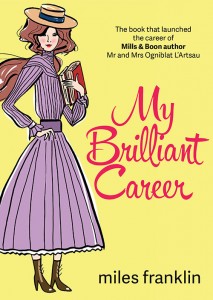 I’d better start by ‘fessing up about the above-mentioned “fudge”. Three of the classics are obvious, Miles Franklin’s My brilliant career, Ruth Park’s Swords and crowns and rings and Christina Stead’s Ocean of story. The fourth, Catherine Gaskin’s 1962 novel I know my love was not identified as classic by the reviewer. It’s not a literary book, but a genre book that is still read 50 years after publication can, for our purposes, be called a classic – don’t you think?
I’d better start by ‘fessing up about the above-mentioned “fudge”. Three of the classics are obvious, Miles Franklin’s My brilliant career, Ruth Park’s Swords and crowns and rings and Christina Stead’s Ocean of story. The fourth, Catherine Gaskin’s 1962 novel I know my love was not identified as classic by the reviewer. It’s not a literary book, but a genre book that is still read 50 years after publication can, for our purposes, be called a classic – don’t you think?
Anyhow, let’s look at the books. Nancy (ipsofactodotme) wrote up My brilliant career by answering a series of questions. I think her answer to one gets right to the heart of why this is a classic:
I think the theme and key to the success of the book lies in this basic thought of a rebellious voice: a strong willed woman does NOT have to settle for less when she knows she is capable of more!
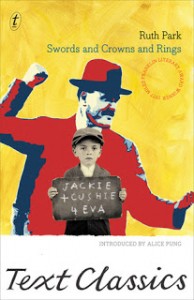 Hallelujah, sister! But now, our second classic, Ruth Park’s epic and Miles Franklin award-winning historical novel, Swords and crowns and rings which follows the story of a “dwarf” through the first half of the twentieth century. It was reviewed by our History-Memoir-Biography team member Brona (Brona’s Books) who says that it’s not an experimental or challenging book, but is beautifully realised:
Hallelujah, sister! But now, our second classic, Ruth Park’s epic and Miles Franklin award-winning historical novel, Swords and crowns and rings which follows the story of a “dwarf” through the first half of the twentieth century. It was reviewed by our History-Memoir-Biography team member Brona (Brona’s Books) who says that it’s not an experimental or challenging book, but is beautifully realised:
Park’s writing is evocative and authentic. She brings the hardships and the details of Depression era NSW to life so vividly that you can feel the hunger, the cold and the fear along with her characters. However, the bleakness of the times was compensated for by the warmth and grace of her central characters.
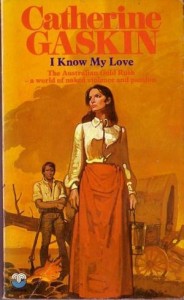 Having read the book, I think Brona’s assessment is spot on. If you haven’t read this novel, but have an interest in Australian social history, you could do far worse than start with this book. It was Brona, too, who reviewed the “fudged” classic, Catherine Gaskin’s I know my love. She read it in her teens and was pleased to find that, although she’d call it comfort reading now, it still holds up as a good read:
Having read the book, I think Brona’s assessment is spot on. If you haven’t read this novel, but have an interest in Australian social history, you could do far worse than start with this book. It was Brona, too, who reviewed the “fudged” classic, Catherine Gaskin’s I know my love. She read it in her teens and was pleased to find that, although she’d call it comfort reading now, it still holds up as a good read:
This could so easily have been just another historical romance pot-boiler, but Gaskin had a knack of getting the tone and style just right. Most of her books were well-written, easy to read, with natural dialogue and believable characters.
It’s interesting that for a writer who was so popular for so long, Brona’s is the first review of a Gaskin book for our challenge. I’m so glad to see it here.
Vale Georgia Blain (and Anne Deveson)
Again, I normally wouldn’t have chosen this topic for my November post, since novelist Georgia Blain (52) died in December, but for the reasons given above, I’m including her here. She died from a brain tumour just 12-13 months after diagnosis. Those of you who have been following the news will know that Blain’s mother, the writer, broadcaster, filmmaker and social activist Anne Deveson (86), also died in December, just three days after her daughter.
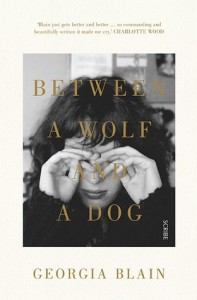 Blain published ten books, comprising eight novels, a collection of short stories, and a memoir. Six of these have been reviewed at least once for the challenge. Her latest book, Between a wolf and a dog, which won this year’s Queensland Literary Award, was reviewed three times in October, which I covered in my October report. It would be lovely to see more of her books read and reviewed, as a tribute, over the coming months.
Blain published ten books, comprising eight novels, a collection of short stories, and a memoir. Six of these have been reviewed at least once for the challenge. Her latest book, Between a wolf and a dog, which won this year’s Queensland Literary Award, was reviewed three times in October, which I covered in my October report. It would be lovely to see more of her books read and reviewed, as a tribute, over the coming months.
Meanwhile, I’m sorry to see that only one of Anne Deveson’s four works have been reviewed here, her part-biography-part academic study, Resilience. Nalini Hayes (DarkMatterZine) who reviewed it back in 2014. She liked the book, saying partway through her review, that
Grief and life’s hard knocks are raised as realities with respect for those suffering setbacks. This isn’t one of those self-indulgent feel-good saccharine-sweet novels posing as non-fiction! The author discussing resilience in the face of her child’s illness and subsequent suicide, his response to worsening schizophrenia, gives this book a gritty realism, a credibility, other similar works on the subject may lack
And this brings me to what was probably Deveson’s best known book, Tell me I’m here which tells the story of her and her family’s experience of schizophrenia through her son Jonathan. It was significant for the honest way it brought the subject into the public arena and, again, it would be great to have a review here.
It’s very sad that we have lost these two great writers.
History/Memoir/Biography
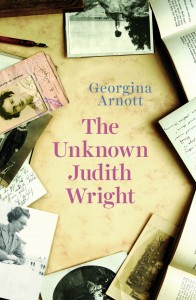 Given this was our most reviewed category this month, I figure it deserves a little section to itself. Not all reviews categorised History/Memoir/Biography make their way to my little corner of the challenge. If their subject matter is a literary figure – such as Georgina Arnott’s The unknown Judith Wright (reviewed by Jeannette Delamoir for The Newtown Review of Books – they should be flagged “literary”. Otherwise, I would only expect them in my list, if their form or style or approach varies from the usual format for these sorts of works.
Given this was our most reviewed category this month, I figure it deserves a little section to itself. Not all reviews categorised History/Memoir/Biography make their way to my little corner of the challenge. If their subject matter is a literary figure – such as Georgina Arnott’s The unknown Judith Wright (reviewed by Jeannette Delamoir for The Newtown Review of Books – they should be flagged “literary”. Otherwise, I would only expect them in my list, if their form or style or approach varies from the usual format for these sorts of works.
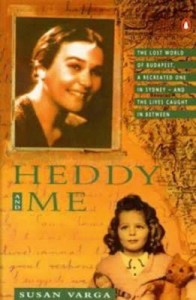 So, for example, Susan Varga’s 1994 Heddy and me, which I reviewed this month, meets this criterion because it combines biography (the story of Susan’s mother “Heddy”) with memoir (Susan’s own story) in a way which differs from a typical memoir which might happen to talk about parents or a typical biography which might mention children. Varga’s work interweaves these stories, and is a good read. I wrote in my post:
So, for example, Susan Varga’s 1994 Heddy and me, which I reviewed this month, meets this criterion because it combines biography (the story of Susan’s mother “Heddy”) with memoir (Susan’s own story) in a way which differs from a typical memoir which might happen to talk about parents or a typical biography which might mention children. Varga’s work interweaves these stories, and is a good read. I wrote in my post:
Heddy and me was, I suspect, groundbreaking when it was first published, not so much for its portrayal of personal experience of the Holocaust, because such stories started appearing soon after the war, but for Varga’s intensely personal exploration of women’s experience and identity across three generations, before, during and after the war.
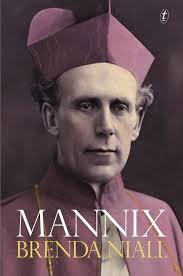 The other books reviewed in this category included Helen Garner’s Everywhere I look (reviewed by Jonathan Show of Me Fail? I Fly!), Magda Szubanski’s Reckoning (reviewed by Kim Forrester of Reading Matters) and Ngarta Jukuna’s Two sisters (reviewed by Weezelle of Words and Leaves), but the last one I’ll desrcribe is Brenda Niall’s National Biography Award winner Mannix which was reviewed by two participants, Nancy (ipsofactodotme) and Yvonne (The Newtown Review of Books). Nancy found it “very readable, comprehensive” and said that it “at times struck a heart-string”. She also liked that there was “no academic fuzzy language”. Yvonne was also impressed, both with the content and with Niall’s skills as a biographer:
The other books reviewed in this category included Helen Garner’s Everywhere I look (reviewed by Jonathan Show of Me Fail? I Fly!), Magda Szubanski’s Reckoning (reviewed by Kim Forrester of Reading Matters) and Ngarta Jukuna’s Two sisters (reviewed by Weezelle of Words and Leaves), but the last one I’ll desrcribe is Brenda Niall’s National Biography Award winner Mannix which was reviewed by two participants, Nancy (ipsofactodotme) and Yvonne (The Newtown Review of Books). Nancy found it “very readable, comprehensive” and said that it “at times struck a heart-string”. She also liked that there was “no academic fuzzy language”. Yvonne was also impressed, both with the content and with Niall’s skills as a biographer:
Biographies of important dead white men have a long tradition of being uncritical celebrations of public personae and weak depictions of the humans behind the fame. Not so with this book. Despite the paucity of sources for Mannix’s private life, Niall breathes life into him.
I’ve mentioned only a few of the books reviewed this month. To see all books reviewed for the challenge, please check our books reviewed search page.
———————
About Me
I am Whispering Gums and I read, review and blog about (mostly) literary fiction. It was reading Jane Austen when I was 14 years old that turned me on to reading literary fiction/classics, which is why I am here today doing this round-up! Little did Jane know what she started!
My love of Aussie literature started with Banjo Paterson’s ballads and Ethel Turner’s Seven Little Australians in my childhood. But, I didn’t really discover Australian women’s writing until the 1980s when I “met” and fell in love with Elizabeth Jolley, Thea Astley, Olga Masters, Helen Garner and Kate Grenville. Ever since then I have been making sure to include a good percentage of Australian (and other) women writers in my reading diet.






Thanks for the roundup, Sue. I read I Know My Love as a teenager. (The woman who minded us knew Catherine – they went to school together, so her name has stuck in my mind.) Sara Dane was another of hers I read. I wonder if it has stood the test of time? Maybe something to read for #aww2017.
Thanks Elizabeth. I think our special classics focus next year should include genre classics, don’t you?
Definitely!
Thanks for a wonderful roundup Sue. I thought it was kind of sad that Georgia Blain’s death seemed to be written up as an adjunct to her mother’s death. A sort of afterthought. She was so much more than that. One of my New year’s resolutions is to read more of her books starting with her last.
Thanks Debbie – yes, in fact I only heard of hers when I heard the radio interview on Monday with Wendy McCarthy about her mother.
Fabulous round-up as always Sue – I hope my little trip down Gaskin memory lane will prompt someone else to revisit one of her (many, many) books.
The death of both Georgia and Anne so close together is devastating but perhaps their families and friends can take some comfort in that togetherness. Sadly we have now also lost the wonderful Shirley Hazzard.
Shirley Hazard too! Gosh it’s been a bad year for losing much admired and treasured people.
Sorry I didn’t reply earlier, Debbie. I was in Melbourne for husband’s aunt’s 90th birthday and catching up with our kids, and then of course it was straight into Christmas visitors and planning.
Yes, it has been a bad year hasn’t it. Like Deveson she was only early 80s. I hope to go further than that, but who knows what life has in store.